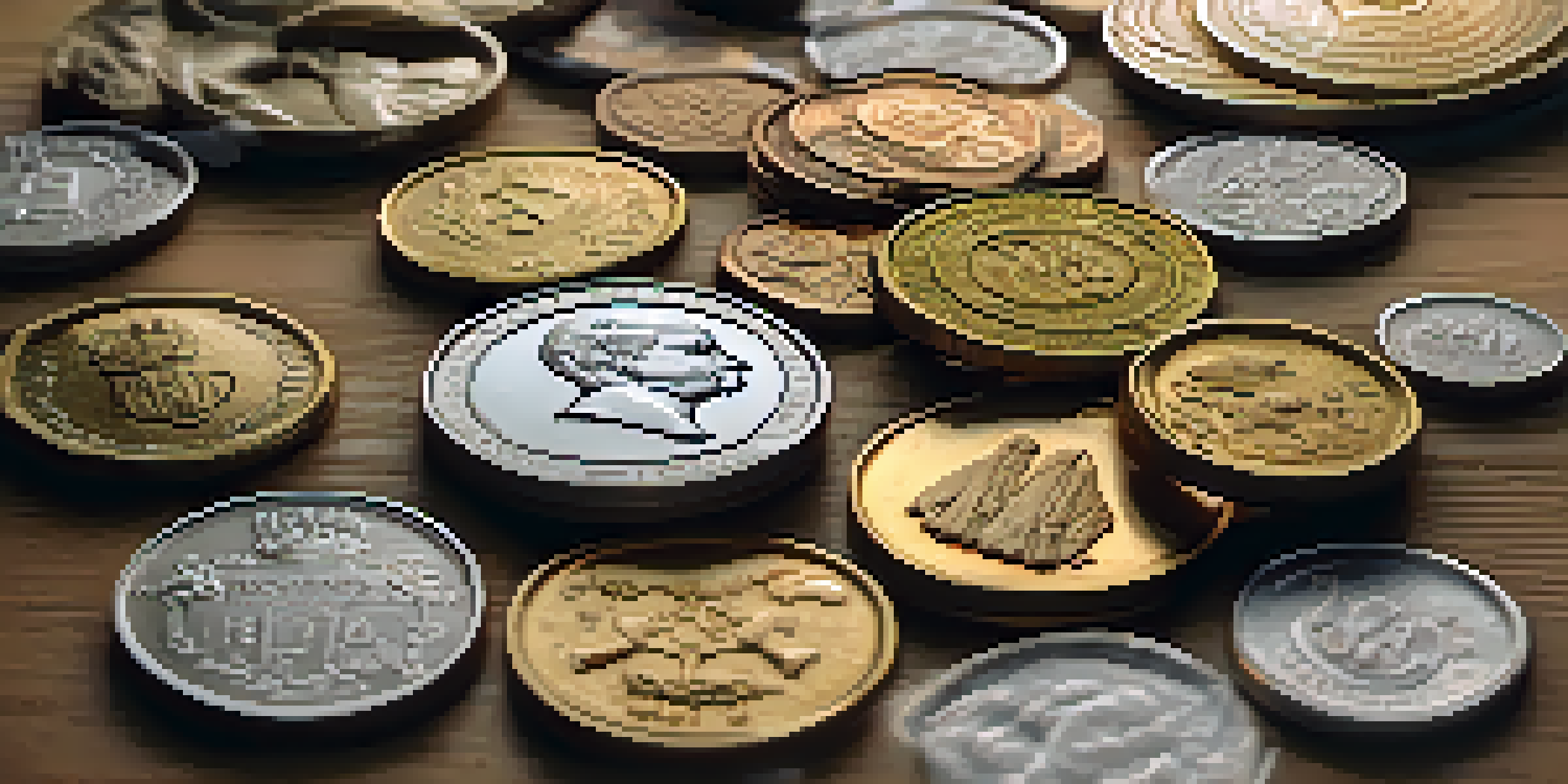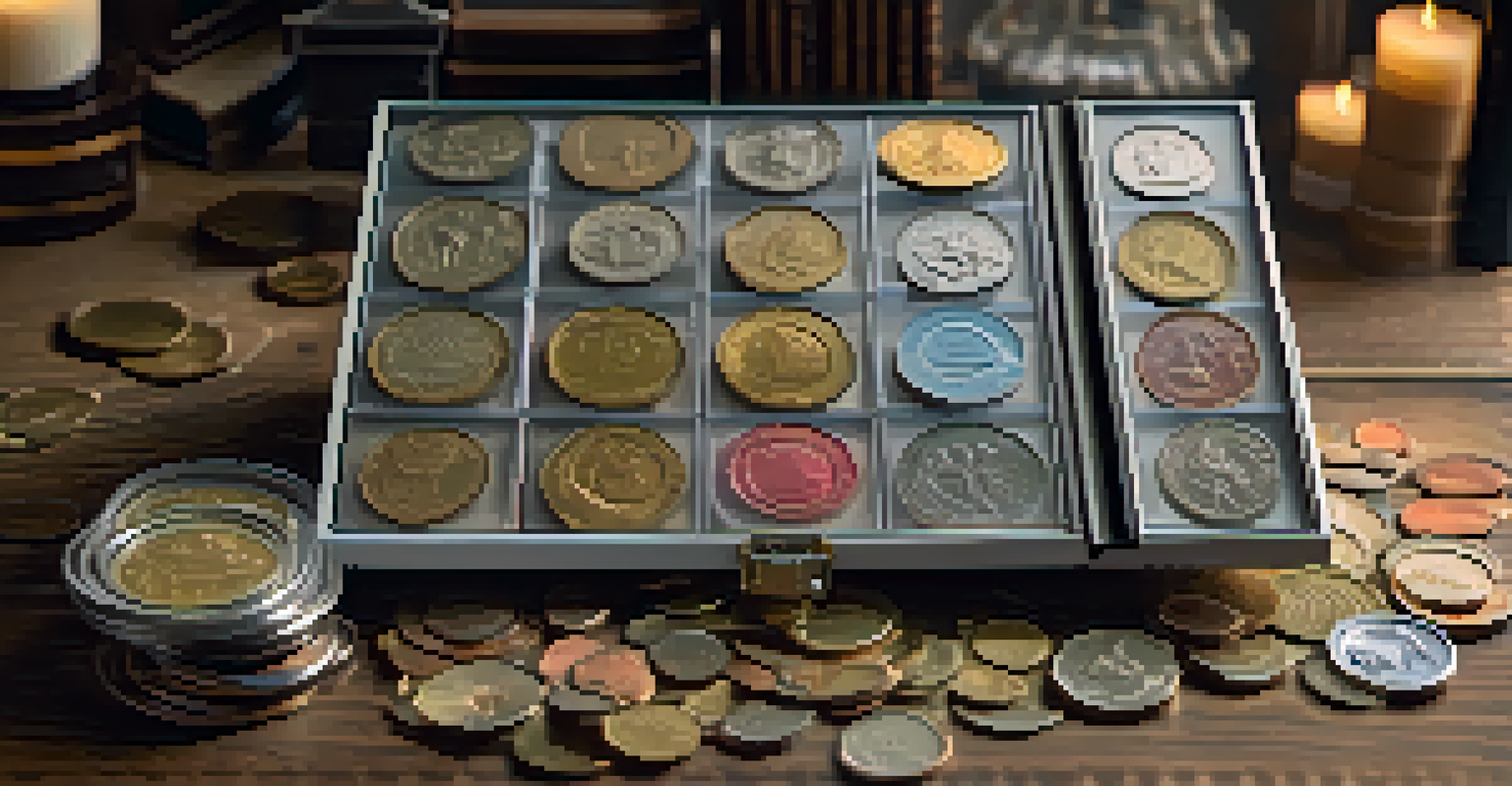Common Mistakes New Coin Collectors Should Avoid

Neglecting to Research Before Buying Coins
One of the most common mistakes new coin collectors make is diving in without doing proper research. Just like any hobby, understanding the basics can save you from costly errors. Familiarizing yourself with coin types, values, and market trends can help you make informed purchasing decisions.
The more you know, the more you realize you don’t know.
Take time to explore reputable resources such as books, websites, and collector forums. These platforms can provide valuable insights into what to look for and what to avoid. Additionally, consider joining a local coin club where you can learn from more experienced collectors.
Remember, knowledge is power! The more you know about the coins you’re interested in, the less likely you are to fall victim to scams or overpay for items. So, before you reach for your wallet, arm yourself with information.
Ignoring Coin Condition and Grading
Another common pitfall for beginners is overlooking the importance of coin condition and grading. Coins are graded on a scale from one to seventy, with higher numbers indicating better condition. Understanding this grading system can significantly affect a coin's value, so it's essential to familiarize yourself with it.

For instance, a coin in uncirculated condition can be worth significantly more than one that shows signs of wear and tear. Using magnifying tools can help you assess a coin's condition accurately. Always remember, a coin's grade can make or break your investment.
Research is Key Before Buying Coins
Understanding coin types, values, and market trends can help avoid costly mistakes.
Taking the time to learn about grading not only ensures you’re paying a fair price but also helps you build a more valuable collection over time. So, don’t skip this crucial step—your future self will thank you!
Purchasing Coins Without Proper Authentication
New collectors often make the mistake of purchasing coins without proper authentication, which can lead to disappointment and financial loss. Counterfeit coins are more common than you might think, and it's essential to verify the authenticity of any coin before making a purchase. Look for reputable dealers who provide authenticity guarantees.
The greatest danger in times of turbulence is not the turbulence; it is to act with yesterday's logic.
You can also seek third-party grading services that evaluate and authenticate coins. These services can provide peace of mind and help ensure you're investing in legitimate items. Additionally, educating yourself about common counterfeiting techniques can also be beneficial.
Ultimately, taking the extra step to confirm authenticity can save you from a lot of headaches down the line. It's better to be cautious than to end up with fakes in your prized collection.
Failing to Keep Coins Properly Stored
Proper storage of your coin collection is just as important as acquiring the coins themselves. New collectors often neglect this aspect, leading to damage and decreased value over time. Coins should be kept in a cool, dry environment, away from direct sunlight and humidity.
Investing in quality storage solutions, such as coin holders or albums, can protect your coins from scratches and environmental damage. Avoid using non-archival materials, as they can cause coins to tarnish or corrode. Additionally, handling coins with clean hands or gloves can help maintain their condition.
Proper Storage Preserves Value
Keeping coins in a cool, dry environment and using quality storage solutions can prevent damage and maintain their worth.
Remember, the way you store your coins can significantly impact their longevity and value. A little effort in storage can go a long way in preserving your collection for years to come.
Overlooking the Importance of Documentation
Documentation is often an overlooked aspect of coin collecting, but it's vital for maintaining the value of your collection. New collectors should keep detailed records of their coins, including purchase dates, prices, and grading information. This practice not only helps you keep track of your investment but also serves as proof of authenticity.
Consider creating a spreadsheet or using specialized coin inventory software to organize your collection. This way, you can quickly reference important details when needed. Additionally, having documentation can be incredibly helpful when it comes time to sell or trade your coins.
In short, maintaining accurate records will help you manage your collection effectively and increase its value in the long run. Don’t underestimate the power of good documentation!
Rushing into Sales Without Understanding Market Trends
Another mistake new collectors often make is rushing into sales without fully understanding market trends. Coin values can fluctuate based on various factors, including demand, economic conditions, and collector interest. Taking the time to monitor these trends can help you decide the best time to sell your coins.
Utilizing resources like price guides, collector forums, and auction sites can provide valuable insights into current market values. Additionally, networking with other collectors can help you gain a better understanding of when to hold onto your coins and when to let them go.
Enjoy Collecting Beyond Profits
Focusing on the joy of collecting and engaging with the community can enhance the overall experience, balancing enjoyment with investment.
By staying informed about market trends, you can maximize your profits and ensure you’re making smart selling decisions. Remember, patience is key in the world of coin collecting!
Ignoring the Joy of Collecting for Profit
Many new collectors fall into the trap of focusing solely on the potential profits from coin collecting, overlooking the joy of the hobby itself. While it’s perfectly fine to view your collection as an investment, it's essential to remember that collecting should be fun and fulfilling. Engaging with the community and learning about the history behind your coins can enhance your overall experience.
Consider setting personal goals that focus on the enjoyment of collecting rather than just monetary gain. For instance, you might aim to complete a specific set or learn about a particular era in numismatics. This approach can lead to a more rewarding journey as you discover the stories behind your coins.

Ultimately, finding a balance between enjoyment and investment can lead to a more satisfying collecting experience. After all, the joy of collecting is often what keeps enthusiasts engaged for years!